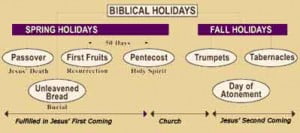Notes to download: Feast of Trumpets - Rosh Hashanah
Leviticus 23:1,2 And the LORD spake unto Moses, saying, Speak unto the children of Israel, and say unto them, Concerning the feasts of the LORD, which ye shall proclaim to be holy convocations, even these are my feasts.
We have studied that Spring Feasts which have all been fulfilled on their very day. Now we look forward future events. They are to yet be fulfilled, on their day too.
The first three feasts Yeshua fulfilled at His first appearance. The Feast of Shavout (Pentecost) was fulfilled on its exact day with the coming of the Holy Spirit. The book of Ruth is read by the Jewish sages and we identify with Ruth the Gentile brought home by Naomi to work a harvest and prepare for the wedding to Boaz her kinsman Redeemer. 
The summer passes and we now come to the 7th month of the calendar. Three feasts are yet to come. Lev 23:23-24 And the LORD spoke unto Moses, saying, Speak unto the children of Israel, saying, In the seventh month, in the first day of the month, shall ye have a Sabbath, a memorial of blowing of trumpets, an holy convocation.
Blowing of trumpets teruw`ah (ter-oo-aw’); from clamor, i.e. acclamation of joy, a shout (Is 44:23) or a battle-cry; especially clangor of trumpets, as an alarm. The ancient Hebrew word for blasting/blast in the above verses is “TaRUOE” (said as “ta-roo-oh-eh”). This word has five letters. The five letters are T-R-U-O-E
T = tau (modern tav) = two crossed sticks. This represents a sign. R = raash (modern resh) = man’s head. This represents first U= uu (modern vav) = tent peg. This represents secureO = oin (modern ayin) = eye. This represents watch E = ea (modern heh) = man with arms raised. This represents look.
So we “Sign (that is) first (for) securing, watching and looking.” In other words an initial indication or alarm that was given to groups of people to secure, watch over and look-out for their family and property, in the case of an emergency, war, or a set-apart time of rejoicing The very meaning of the Feast is embedded in is spelling.
This word can describe the noise made by a 1) trumpet but it also describes the 2) noise made by a large gathering of people shouting in unison (Nu 10:5–6). For example,
“And it shall come to pass when the ram’s horn makes a long blast, when you hear the sound of the shofar, the entire nation will shout a great shout, and the wall of the city shall fall in its place, and the people shall go up as one man against it.” (Joshua 6:5)
In this verse the word “shout” appears twice, once as the verb form of Teruah and a second time as the noun form of Teruah. Although this verse mentions the sound of the shofar (ram’s horn), the two instances of Teruah both refer to the shouting in unison of the Israelites which was followed by the fall of the walls of Jericho.
While the Torah does not explicitly tell us the purpose of Yom Teruah its name may indicate that it is intended as a day of public prayer. The verb form of Teruah often refers to the noise made by a gathering of the faithful calling out to the Almighty in unison. For example:
- “Clap hands, all nations, shout to God, with a singing voice!” (Ps 47:1)
- “Shout to God, all the earth!” (Ps 66:1)
- “Sing to God, our strength, shout to the God of Jacob!” (Ps 81:3)
- “Shout to YHVH, all the earth!” (Ps 100:1)
From the horn of a ram the Israelites made a “Shofar” and it makes an alarming sound when blown. This Shofar played a highly significant role in Hebraic culture.